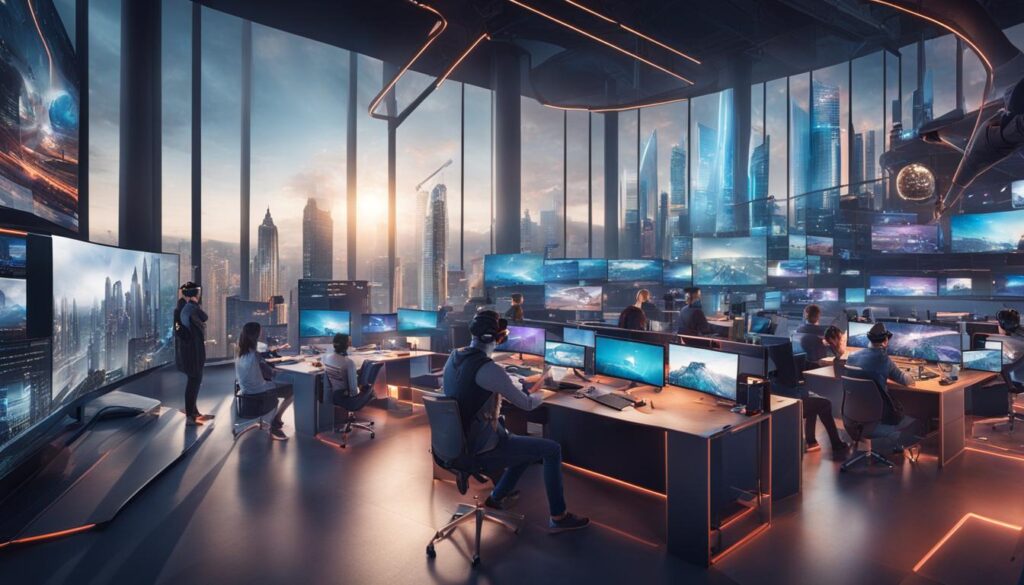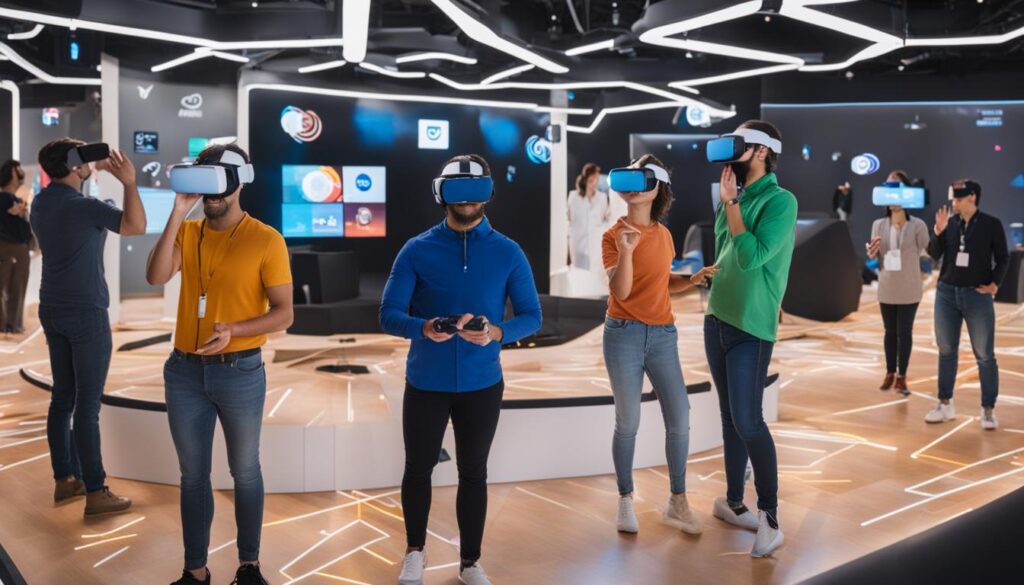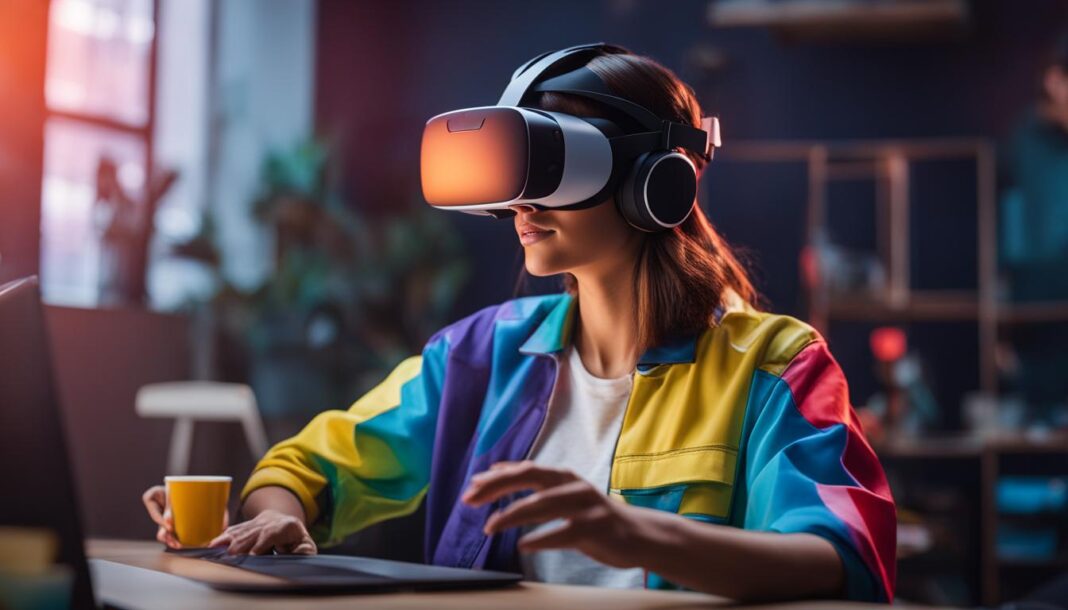If you’re looking to enhance your career in animation, VR development training can provide you with the skills you need. With virtual reality being a rapidly growing industry, learning how to develop VR experiences and applications is a valuable asset. Whether you’re a beginner or looking to advance your existing knowledge, VR development courses can help you master the tools and techniques necessary to create immersive virtual reality content. You can find a range of animation courses available online that cover topics such as software engineering, systems design, computer graphics, and more.
Browse VR Development Courses
VR development courses offer a wide range of skills and knowledge that are essential for creating virtual reality experiences. These courses cover topics such as software engineering, systems design, software architecture, and virtual reality itself. By taking these courses, you can gain expertise in software engineering tools, project management, human-computer interaction, and more. Additionally, you’ll learn about computer graphics techniques, visualization, and graphic design, which are vital for creating realistic and visually appealing VR content.
One of the key areas covered in VR development courses is software engineering. These courses teach you the principles and best practices of software engineering, including coding standards, version control, and debugging techniques. You’ll also learn how to design modular and scalable software architectures to support the development of complex VR applications.
Another important aspect of VR development is systems design. VR development courses provide an in-depth understanding of systems design principles and techniques, helping you design efficient and high-performing VR applications. You’ll learn how to optimize system resources, handle data synchronization, and implement real-time interactions in virtual reality environments.
Virtual reality itself is a central topic in VR development courses. These courses delve into the concepts, technologies, and applications of virtual reality, teaching you how to create immersive and interactive experiences. You’ll learn about the different types of VR hardware, tracking systems, and interaction methods, allowing you to design intuitive and compelling user experiences in virtual reality.
| Software Engineering | Systems Design | Software Architecture | Virtual Reality |
|---|---|---|---|
| Learn software engineering tools and techniques for VR development | Master systems design principles for efficient and high-performing VR applications | Design modular and scalable software architectures for complex VR projects | Understand the concepts and technologies of virtual reality in depth |
| Gain expertise in project management and collaboration in VR development | Optimize system resources and handle data synchronization for VR applications | Implement real-time interactions and responsive user interfaces in virtual reality | Create immersive and interactive experiences in virtual reality environments |
| Learn coding standards, debugging techniques, and software testing for VR | Design intuitive and compelling user experiences in virtual reality | Understand the different types of VR hardware and tracking systems | Stay updated with the latest trends and advancements in VR technology |
Skills Needed for VR Development
To succeed in the field of VR development, it is essential to acquire a range of skills and knowledge. This includes proficiency in programming languages, game development concepts, 3D modeling, and familiarity with popular game engines such as Unity or Unreal Engine.
Programming Languages
Programming languages play a critical role in VR development. A solid foundation in languages such as C#, C++, or Python is crucial as they are commonly used in creating VR experiences and applications. Proficiency in these languages allows developers to efficiently write code and implement interactive functionalities.
Game Development Concepts
Understanding the basics of game development is essential for creating immersive VR experiences. Familiarity with game development concepts and frameworks enables developers to design and build interactive virtual environments. This includes knowledge of game mechanics, physics simulation, and user input handling in the VR space.
3D Modeling
Proficiency in 3D modeling is essential for creating virtual objects and environments in VR. Whether using tools like Blender or Unity’s built-in modeling features, developers must be able to design and optimize realistic and visually appealing assets. This skill allows for the creation of engaging and immersive VR experiences.
Unity or Unreal Engine
Learning either Unity or Unreal Engine is vital as these are popular game engines that provide VR development capabilities. These engines offer powerful tools and features specifically designed for VR development, making them the go-to choices for many developers. Having expertise in either engine allows for efficient and effective creation of VR content.
By acquiring these essential skills and knowledge, aspiring VR developers can position themselves for success in this rapidly growing industry.

Who Should Study VR Development?
VR development is an exciting field that appeals to a wide range of individuals with diverse interests and backgrounds. Whether you’re a technology enthusiast, have a passion for computer programming, or are fascinated by virtual reality, studying VR development can open up new opportunities for you. Additionally, having a creative mindset and enjoying problem-solving are important qualities that can contribute to your success in the field.
If you have a background in computer science, game development, or graphic design, studying VR development can be a natural progression for you. Your existing knowledge in these fields can provide a solid foundation as you delve into the world of virtual reality. However, even if you’re a complete beginner, VR development courses can help you acquire the necessary skills and expertise to pursue a career in this rapidly growing industry.
Good communication and teamwork skills are also beneficial in the field of VR development. Collaboration is often necessary when working on complex VR projects, and being able to effectively communicate your ideas and work well with others can greatly enhance your success. So whether you have a technical background or a more creative mindset, studying VR development can be a rewarding and fulfilling path to explore.
Table: Skills and Backgrounds Suitable for VR Development
| Background | Skills/Qualities |
|---|---|
| Technology Enthusiast | Passion for emerging technologies, curiosity to learn about VR |
| Computer Programming | Knowledge of programming languages, problem-solving abilities |
| Virtual Reality | Fascination with immersive experiences, understanding of VR principles |
| Creative Mindset | Ability to think outside the box, enjoy creating visually appealing content |
As you can see, VR development is a field that welcomes diverse backgrounds and skill sets. Whether you excel in computer programming, have a passion for virtual reality, or possess a creative mindset, studying VR development can provide you with the necessary tools and knowledge to succeed in this exciting industry.
So, if you’re eager to explore the world of virtual reality and embark on a career that merges technology and creativity, VR development may be the perfect fit for you.
Topics to Study in VR Development
When diving into the field of VR development, there are several key topics that you should focus on to enhance your skills and knowledge. These topics will equip you with the foundation needed to create immersive virtual reality experiences. Let’s explore some of these essential areas of study:
Virtual Reality Fundamentals
An understanding of virtual reality fundamentals is crucial for anyone looking to excel in VR development. This includes learning about the history of virtual reality, the core principles that underpin this technology, and the various types of virtual reality experiences. By grasping these fundamentals, you’ll be better equipped to create compelling and impactful VR content.
VR Design Principles
The design principles specific to virtual reality play a significant role in creating engaging and user-friendly experiences. These principles encompass aspects such as user interface (UI) and user experience (UX) design, spatial audio, navigation, and interaction design within virtual reality environments. By studying VR design principles, you’ll be able to create immersive and intuitive VR experiences that captivate users.
3D Modeling and Animation
3D modeling and animation are key skills to possess in VR development. These skills allow you to create virtual objects, environments, and characters that feel realistic and visually appealing. By mastering 3D modeling tools and techniques, you’ll have the ability to bring your virtual reality experiences to life through detailed and lifelike visuals.
Game Development
Many VR applications involve creating immersive gaming experiences. Therefore, understanding game development principles and frameworks is crucial for VR developers. By studying game development, you’ll gain knowledge in areas such as game mechanics, physics simulations, character animation, and level design. This expertise will enable you to create captivating and interactive VR games.
By delving into these topics, you’ll be well on your way to becoming a skilled VR developer who can create impactful and immersive virtual reality experiences. Now, let’s take a look at a table that summarizes these key topics for easy reference:
| Topic | Description |
|---|---|
| Virtual Reality Fundamentals | Learn about the history, core principles, and types of virtual reality experiences. |
| VR Design Principles | Understand UI/UX design, spatial audio, navigation, and interaction design in VR environments. |
| 3D Modeling and Animation | Master 3D modeling tools and techniques for creating realistic virtual objects and environments. |
| Game Development | Study game mechanics, physics simulations, character animation, and level design for immersive VR gaming experiences. |
By focusing on these essential topics, you’ll be equipped with the necessary skills and knowledge to excel in the exciting field of VR development.
XR Bootcamp’s VR Development Courses
XR Bootcamp offers a range of VR development courses designed to cater to both beginners and advanced learners. Taught by experienced VR professionals, these courses provide comprehensive training in various aspects of VR development. Whether you are looking to gain foundational skills or expand your existing knowledge, XR Bootcamp’s VR development courses are tailored to meet your learning objectives.
With a focus on hands-on learning, these courses provide practical experience that allows you to apply your knowledge to real-world projects. You’ll have the opportunity to learn from expert instructors who are passionate about sharing their expertise and helping you succeed in the field of VR development.
XR Bootcamp also offers a variety of learning formats, including master classes and on-demand recorded workshops. The master classes are designed for advanced developers looking to enhance their skills and tackle more complex VR projects. On the other hand, the on-demand recorded workshops cater to beginners and advanced learners alike, providing flexibility and accessibility.
Table: XR Bootcamp’s VR Development Courses
| Course | Description | Format |
|---|---|---|
| Prototyping XR Applications | Learn how to design and prototype VR experiences using industry-standard software and tools. | Master class |
| VR Software Development | Gain expertise in VR software engineering and development, including coding and optimization techniques. | Master class |
| Advanced Interactions | Explore advanced interaction techniques in VR, including hand tracking, haptic feedback, and gesture recognition. | Master class |
| Introduction to VR Development | Get started with VR development, covering the basics of VR technology, software tools, and development environments. | On-demand recorded workshop |
| VR Design Principles | Learn the fundamentals of VR design and user experience, creating immersive and intuitive virtual environments. | On-demand recorded workshop |
Success Stories from XR Bootcamp Graduates
XR Bootcamp has produced a talented cohort of VR professionals who have achieved remarkable success in the field. These graduates have not only completed VR development courses but have also built impressive VR project portfolios that showcase their skills and creativity. With the knowledge and expertise gained from XR Bootcamp, they have gone on to work at renowned companies in the industry, such as Ubisoft, Samsung, Microsoft, and more.
Through their dedication and passion for VR development, these graduates have contributed to the success of various VR projects. They have created immersive experiences, developed cutting-edge VR software, designed intuitive user interfaces, and crafted captivating VR games. Their work has pushed the boundaries of virtual reality, bringing groundbreaking experiences to audiences around the world.
The success of XR Bootcamp graduates is a testament to the effectiveness of the VR development courses offered. These courses provide comprehensive training and hands-on learning experiences, allowing students to gain practical skills and industry insights. The instruction from experienced professionals, combined with networking opportunities, offers students a valuable support system as they embark on their VR careers.
| Graduate | Company | Notable VR Projects |
|---|---|---|
| Emily Johnson | Ubisoft | Assassin’s Creed VR Experience, Far Cry VR: Dive into Insanity |
| Michael Chen | Samsung | Samsung Gear VR Apps, Samsung Galaxy VR |
| Samantha Lee | Microsoft | Minecraft VR Edition, Microsoft HoloLens Projects |
| David Thompson | Oculus | Oculus Quest Games, Oculus Rift Experiences |
These success stories demonstrate the immense potential and career opportunities in the field of VR development. With the right training and guidance, individuals can embark on a fulfilling journey and make a significant impact in the ever-evolving world of virtual reality.
Benefits of XR Bootcamp’s VR Development Courses
When considering VR development courses, XR Bootcamp stands out for its numerous benefits that can help students excel in the field. With a focus on providing hands-on learning experiences, XR Bootcamp ensures that students can apply their knowledge in real-world projects. This practical approach allows students to gain valuable experience and develop the skills necessary to succeed in VR development.
Another advantage of XR Bootcamp’s courses is the expertise of the instructors. The instructors at XR Bootcamp are experienced VR professionals who are passionate about sharing their knowledge and guiding students towards success. Their industry experience and insights provide students with valuable perspectives and practical advice.
In addition to hands-on learning and expert instructors, XR Bootcamp also offers networking opportunities for students. Networking is vital in any industry, and VR development is no exception. Through XR Bootcamp, students have the chance to connect with senior-level industry professionals, expand their professional network, and gain valuable contacts for future career opportunities.

Networking Opportunities
At XR Bootcamp, you’ll have the opportunity to network with professionals in the field of VR development. Building connections is crucial for your career advancement and can open doors to exciting job opportunities in the future.
| Networking Benefits at XR Bootcamp | Description |
|---|---|
| Industry Expert Connections | Connect with senior-level professionals who can provide valuable insights and guidance. |
| Peer Networking | Interact and collaborate with fellow students who share your passion for VR development. |
| Networking Events | Participate in networking events organized by XR Bootcamp to connect with industry leaders, prospective employers, and potential clients. |
By enrolling in XR Bootcamp’s VR development courses, students can benefit from hands-on learning experiences, expert instructors, and networking opportunities. These advantages provide a solid foundation for students to thrive in the field of VR development and pursue successful careers in this rapidly growing industry.
Testimonials from XR Bootcamp Participants
XR Bootcamp has received glowing testimonials from participants who have successfully completed their VR development courses. These testimonials highlight the value and quality of the courses, as well as the expertise of the instructors. Students have praised the comprehensive content covered in the courses, which provides a strong foundation in VR development skills and knowledge.
Many participants have expressed their appreciation for the hands-on learning experiences offered at XR Bootcamp. The courses emphasize practical application, allowing students to work on real-world projects and gain valuable experience. This approach has been instrumental in helping students develop the necessary skills to succeed in the field of VR development.
| Participant | Testimonial |
|---|---|
| John | “XR Bootcamp’s VR development courses exceeded my expectations. The instructors were knowledgeable and passionate, and the hands-on projects helped me build a strong portfolio. I now feel confident in my ability to pursue a career in VR development.” |
| Sarah | “I couldn’t be happier with my experience at XR Bootcamp. The courses were well-structured and covered all the essential topics in VR development. The instructors provided valuable insights and guidance throughout the program. I highly recommend XR Bootcamp to anyone interested in pursuing a career in VR.” |
| Michael | “As someone with no prior experience in VR development, XR Bootcamp was the perfect starting point for me. The courses were beginner-friendly and provided a solid foundation in the necessary skills. The instructors were patient and supportive, making the learning process enjoyable. I’m now equipped with the skills I need to pursue my passion for VR development.” |
Overall, the testimonials from XR Bootcamp participants demonstrate the effectiveness of their VR development courses in helping individuals succeed in the field. The combination of expert instructors, hands-on learning experiences, and practical projects has enabled students to gain the skills and knowledge necessary to excel in VR development.
Conclusion
VR development opens up exciting career opportunities in the rapidly growing field of virtual reality. By acquiring the skills and techniques taught in VR development courses, you can position yourself for success in this industry. XR Bootcamp provides a comprehensive platform for individuals to learn and excel in VR development, with expert instructors, hands-on learning experiences, and valuable networking opportunities.
The future of VR looks promising, with continuous advancements in technology and an increasing demand for immersive experiences. As virtual reality continues to evolve, so do the possibilities for innovation and creativity in this field. By staying updated on the latest trends and honing your VR development skills, you can play a significant role in shaping the future of virtual reality.
With the right skills and a strong project portfolio, you can build a successful career in VR development. The demand for skilled VR professionals is on the rise, and by mastering the tools and techniques in VR development, you can seize the numerous career opportunities available in this industry. Whether you aspire to be a VR developer, VR software engineer, VR UX/UI designer, or VR game developer, XR Bootcamp equips you with the necessary expertise to thrive in your chosen VR career path.



